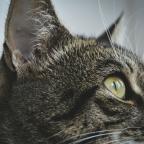
Cat given life-saving brain surgery to remove tumour
A beloved family cat has been given a titanium skull after a life-saving operation to remove a benign tumour on his brain.
Henry, a seven-year-old domestic short haired cat, was brought to Bristol Vet Specialists one weekend as he had not been eating properly and he was very lethargic.
His owner Maggie Gibb, had been getting increasingly worried about Henry, as his condition had been gradually deteriorating for a couple of weeks.
The animal hospital’s team of leading neurologists immediately conducted examinations of Henry. They found that he was unable to walk very well, indicating a possible brain issue.
So, Henry was put into the hospital’s state-of-the-art MRI scanner which revealed that he had a large mass pushing on his brain. Specialist interpretation of the MRI images showed that a tumour called a meningioma was the most likely culprit.
Henry was quickly rushed to an operating theatre where a large team of surgeons and nurses undertook a ‘craniotomy’ surgery – the surgical removal of part of his skull to successfully remove the offending meningioma. A state-of-the-art titanium mesh was then used to repair Henry’s head, acting as part of his skull. This complex and precise operation took over two hours.
When the lab results came back, the tumour was confirmed as benign, and that Henry’s prognosis was good. Miraculously, only days after his successful surgery, Henry was back on his feet. And six months on, Henry is fully back to his old normal self. Due to new hair regrowth on his head, it would never be known he had had such an operation.
Owner Maggie said: “Henry’s condition must have been having an impact well before his symptoms appeared. It was just so subtle. We thought has was just slowing down.
Leading veterinary surgeon Dr. Nicolas Granger, who led the team, said: “In these cases, cats often have subtle signs that escape owners’ detection. They are seen as ‘ageing’ to a point where their condition dramatically worsens. The increase in brain pressure is then such that emergency surgery is needed. With adequate equipment and trained teams, treating this disease can be very successful and extremely rewarding.”
Maggie added: “Henry is doing really well now. He’s so different from before. It’s like he’s become a younger version of himself. He’s playing like a kitten and runs around in the morning like he’s discovered life is good again! His eating pattern has changed too - as he eats breakfast in the morning and finishes his evening meal before bed. I can’t put into words how I feel about him having another chance at life, however long that will be.”
Bristol Vet Specialists is one of the largest and most advanced animal hospitals in the UK. The 30,000 sq. ft. multidisciplinary hospital has been custom-built with cutting-edge facilities and equipment. It employs some of the most qualified and experienced veterinary professionals in the world and employs a multi-disciplinary approach, with an entire team around every patient to ensure the best outcome. The site has been designed to facilitate the development of new and emerging treatments and offers the latest technology and treatments in all small animal disciplines including; general surgery, orthopaedics, neurology and neurosurgery, internal medicine, ophthalmology, cardiology, dermatology, oncology and dentistry, as well as dedicated anaesthesia, analgesia, diagnostic imaging and intensive care departments. To learn more visit https://www.bristolvetspecialists.co.uk.







